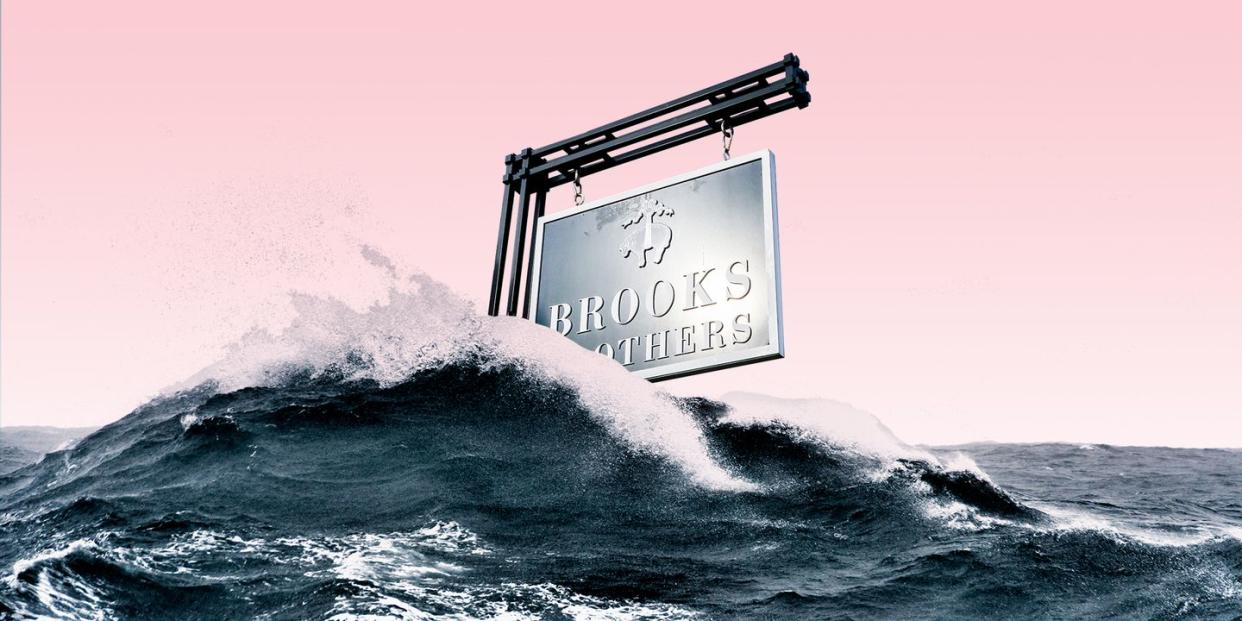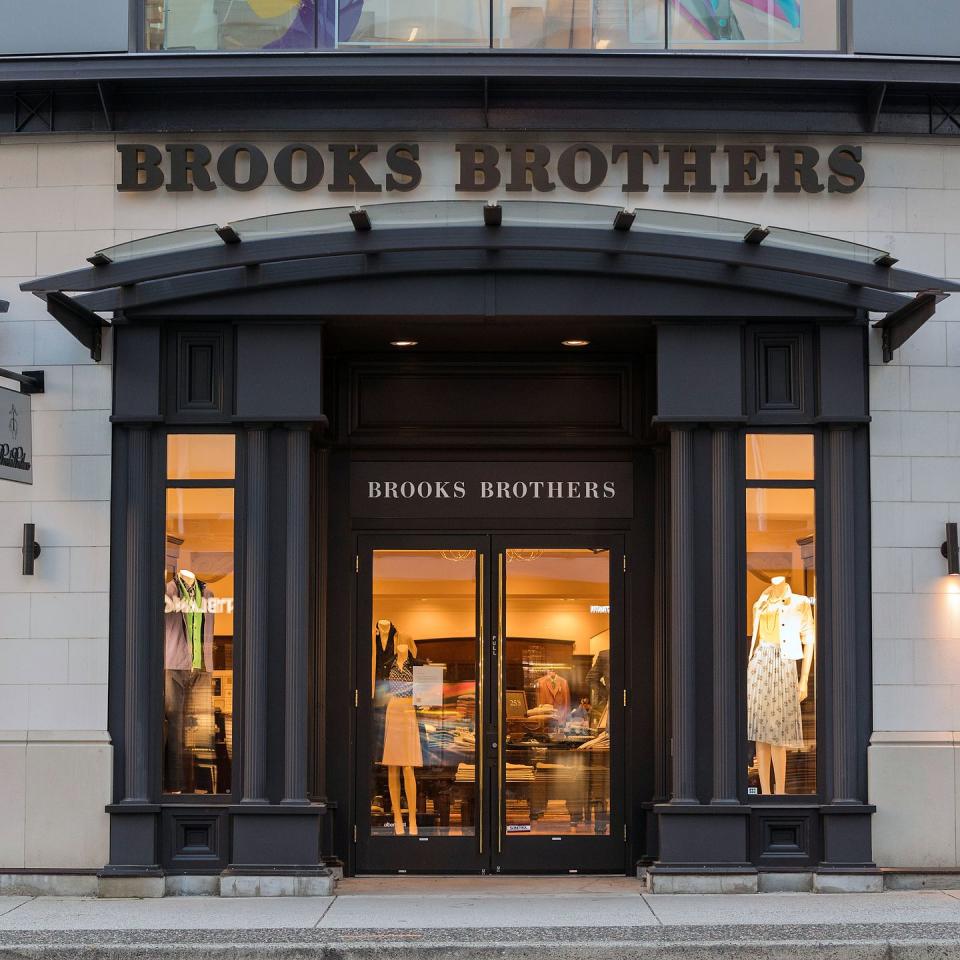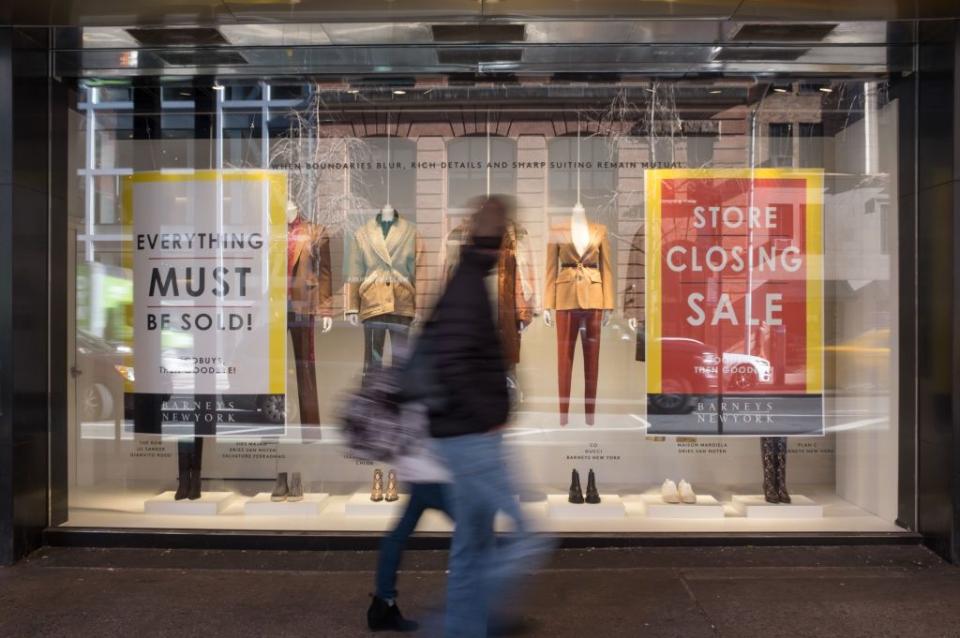Two Potential Buyers Are Competing for the Future of Brooks Brothers

Earlier this week, Brooks Brothers, the oldest menswear retailer in the country and the company responsible in large part for introducing the concept of ready-to-wear to the American masses, officially filed for Chapter 11 bankruptcy. Brooks Brothers' fate reflects that of so many once-mighty brands, severely hobbled by dwindling foot traffic even before the onset of a global pandemic and now suffering from exacerbated economic uncertainty and fading consumer interest.
There's little doubt that Brooks Brothers' bankruptcy represents the end of an era, but this has been a long time in the making. The brand's been struggling for years to convince casually dressed customers to wander back into its stores—250 in the U.S. alone, though it plans to close 51—for more than the occasional one-time purchase. Attempts to pivot to appeal to younger shoppers outside of the brand's core customer base were often ill-received, alienating more than a few longtime customers in the process. By 2019, the company was already entertaining the option of a sale, though the pandemic effectively tanked that possibility.

If all this sounds grim, there's one thing it's crucial to remember right now: Brooks Brothers isn't dead yet. Don't start panic-buying repp ties or dabbing your eyes on the sleeve of your oxford cloth button-down while you mourn its passing. Remember the choruses of "RIP J.Crew" that rang out online just a couple of months ago? Well, as it turns out, you can still get yourself a Ludlow suit.
That's because Chapter 11 bankruptcy, an arduous and often expensive legal process, allows the firm involved to reorganize its debt in the hopes of eventually emerging from the filing a much stronger organization. In filing for Chapter 11 today, Brooks Brothers joins a long list of ailing retailers, from J.Crew to JCPenney, that, though officially bankrupt, still operate in some capacity, often retaining control of their sizable retail footprints. Provided it can find a buyer, Brooks Brothers will surely soldier on, though on what scale and in what form remains to be seen. (The brand issued a relatively optimistic statement on Twitter the day of the bankruptcy announcement.)
To our loyal customers. pic.twitter.com/OcAqFbu8v2
— Brooks Brothers (@BrooksBrothers) July 8, 2020
What the iconic American retailer decides to do now (and with who) is largely out of its control. But if potential buyers think the company's identity is still worth investing in, chances are you'll be seeing products from a new and improved—or at least debt-free—Brooks Brothers in the not-so-distant future.
And, as of this morning, that's looking increasingly likely. Two possible buyers have emerged, and if you've been following the frenetic boom-and-bust cycle that's been retail's MO recently, one of them probably seems mighty familiar. Authentic Brands Group, the management company that bought Barneys New York after a protracted auction process last year, is expected to put in a bid on yet another American apparel mainstay, in partnership with Simon Property Group. ABG's interest lends credence to the idea that Brooks Brothers' intellectual property still resonates strongly with enough customers to warrant resuscitating the brand—in name, at least—by continuing to sell a pared-down selection of core products.
The competing offer comes from WHP Global, a recently founded brand management platform with plans to invest hefty sums in consumer brands over the next five years. (The company acquired Joseph Abboud for $115 million earlier this year.) For its part, WHP has already pledged $75 million to keep Brooks Brothers running through its bankruptcy proceedings.

Per a press release from last year, WHP specializes in repositioning brands by "leveraging high-growth distribution channels and global digital commerce platforms, in addition to introducing new product categories" relevant to today's customers. In other words, what Brooks Brothers will look like down the line, and whether the retailer will live on as some sort of hybridized DTC brand shilling, say, prep-inflected sweatpants (which didn't seem to work for it in the past), is still anybody's guess.
Adding another layer to this discussion is the news that NSTO, the parent company behind beloved multi-brand retailers Need Supply and Totokaelo (and their corresponding web presences), recently announced it'll be shutting down operations for good. The partnership between the two, orchestrated by investment firm Cormack Capital in 2018, was initially championed as a savvy play to capitalize on both brands' substantial industry cachet. But the pandemic and ensuing shutdown proved too much of a burden to bear, even for a fashion industry favorite long heralded for its distinct merchandising mix and singular perspective.
Speaking of perspective: Looking at NSTO and Brooks Brothers side by side should provide some for us all. Because for Brooks Brothers, bankruptcy represents but another chapter in the brand's two-century-long story. For NSTO—and, in all probability, many more brands affected by the pandemic—this really is the end of the line. Instead of bemoaning the passing of a company that's filed for Chapter 11, then, it might behoove us to consider pouring one out for the brands that are actually shutting their doors for the long haul.
You Might Also Like

